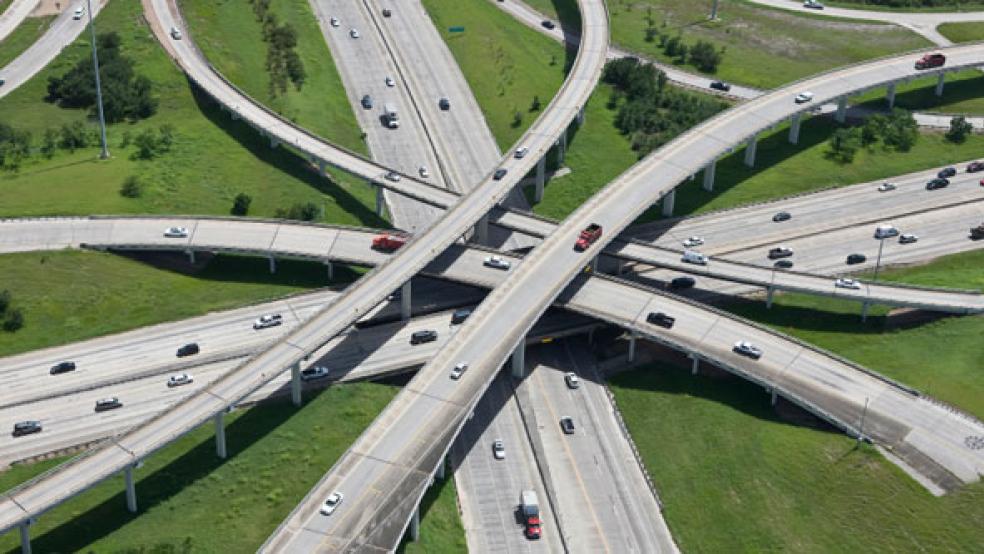Less than four months before federal government and state officials must confront another highway and mass transit funding crisis, two key individuals are pressing the cases for major tax reform to eliminate shortfalls in the Highway Trust Fund.
At a meeting with reporters last week, House Ways and Means Committee Chair Paul Ryan (R-WI) declared, “If we can get comprehensive tax reform, that can help fix it.” The former Budget Committee chair and 2012 GOP vice presidential nominee has set a seven-month timetable for passage of comprehensive corporate and small business tax reform.
If crafted properly, Ryan said, reforms could help unlock many billions of dollars in revenues needed to prop up the Highway Trust Fund.
Related: Obama Says China’s Infrastructure Puts the U.S. to Shame
“There’s no free lunch, I can say that,” Ryan said. “What we’re worried about or working on here at Ways and Means is how do we … address the shortfall [in transportation funding] that’s coming at the end of May.”
At the same time, Transportation Secretary Anthony Foxx said over the weekend that President Obama’s proposal for a one-time 14 percent tax on nearly $2 trillion of foreign earnings is gaining traction among Democrats and some Republicans as a way to fund infrastructure projects. Major American companies are supposed to pay a 35 percent tax on overseas earnings, but many avoid that by using a legal loophole that allows them to keep the earnings in other countries indefinitely.
Under Obama’s repatriation approach, companies such as Apple, Cisco Systems and Microsoft would have a one-time opportunity to pay taxes on overseas earnings at the much lower 14 percent tax rate. In addition, the proposal would impose a permanent 19-percent tax on foreign earnings.
The Obama proposal would raise an estimated $238 billion in the coming years to underwrite an ambitious infrastructure program, while an additional $240 billion would come from the current federal tax on gas and other revenue sources. In all, the six-year, $478 billion infrastructure proposal would provide a 33 percent funding increase for major public works projects.
Related: Obama Wants Long-Term Infrastructure Plan, Not Keystone
In an appearance on C-SPAN that aired Sunday, Foxx touted the president’s plan as a “pro-growth business tax reform” that has the virtue of reducing corporate tax rates for multi-national corporations with vast overseas holdings. While the proposal has drawn sharp fire in some quarters, Foxx argued it provided a good starting point for talks.
“Any time you have a pay-for for something as massive as transportation, there are going to be warts on any given proposal,” he said. “We think this one meets the test of not raising tax rates, not raising deficits, but putting significant dollars into the system.”
The federal Highway Trust Fund – the main revenue source for construction and repair of highways, bridges and mass transit projects – has been in crisis mode for years because of the inadequacy of its funding source. Most trust fund revenues come from an 18.4-cents per gallon gas tax that hasn’t been raised since 1993.
Congressional leaders had high hopes at one time of passing a six-year $100 billion transportation funding bill. But last summer, lawmakers had to settle for a short-term measure that averted a calamity in the states’ infrastructure construction program. Congress essentially used a series of budget gimmicks to authorize an $11 billion, 10-month extension of funding to prevent a 28 percent reduction in infrastructure spending at the peak of the summer construction season.
Related: Governors Join Obama in Infrastructure Spending Plea
While most GOP leaders have dismissed much of Obama’s budget and tax proposals, Ryan began signaling around the time of the State of the Union address that he was looking for common ground with Obama. Speaking broadly about tax reform on NBC’s Meet the Press early this month, Ryan said, “We want to work with this administration to see if we can find common ground on certain aspects of tax reform… If and when that possibility is exhausted, we will put out what we think ought to be done.”
Ryan said Friday, “The only way repatriation can actually work to help with the Highway Trust Fund problem is through comprehensive tax reform.” Sterm tax holidays and retroactive overseas tax repatriation aren’t effective, he said.
The Wisconsin Republican said that if Congress fails to approve corporate tax reform this year, he will be forced to find the funding for highways and bridges from some other source. “If [tax reform] doesn’t happen and for one reason or another we’re incapable of finding an agreement, then we’re going to have to go to finding other ways of bridging the shortfall,” he said.
Politico reported the position follows hints Ryan has made before that he could be open to a proposal similar to one made by Obama.
Related: Biz Group Makes Congress an Infrastructure Offer They Can’t Refuse
Ray LaHood, Obama’s former transportation secretary and an advocate for more transportation spending, said Monday he doubted the administration or Congress could convince the business community to agree to overseas tax repatriation if revenues go toward infrastructure.
“The business community is going to be a lot more in favor of using the repatriated funds to pay for [reduced rates under] corporate tax reform than for infrastructure, or to use it for research and development or to use it for purposes that benefit their own companies,” he said. “To use it for infrastructure, I think it’s going to be a real stretch.”
LaHood, co-founder of the bipartisan Building America’s Future fund, said he agreed with groups like the Chamber of Commerce and the AFL-CIO that Congress should increase the federal gas tax by 10 cents a gallon and index it for inflation to underwrite highway and infrastructure spending.
“Without a big pot of money, we are never going to get back to being number one in infrastructure,” said LaHood.
Top Reads from The Fiscal Times:





